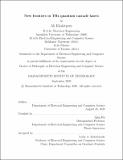New frontiers in THz quantum cascade lasers
Author(s)
Khalatpour, Ali.
Download1227520186-MIT.pdf (6.068Mb)
Alternative title
New frontiers in Terahertz quantum cascade lasers
Other Contributors
Massachusetts Institute of Technology. Department of Electrical Engineering and Computer Science.
Terms of use
Metadata
Show full item recordAbstract
Terahertz (THz) frequencies (0.5-10 THz) are among the most underdeveloped electromagnetic spectra, even though their application potentials are great in imaging, sensing, and communications. This underdevelopment is primarily due to the lack of compact and powerful THz sources. The invention of THz quantum cascade lasers (QCL) held great promise to bridge the gap between semiconductor electronic and photonic devices. However, the demanding cooling requirements for THz QCL have been a hard brake in the race for achieving compact and portable systems, and they have confined THz QCL systems to a laboratory environment. Therefore, raising the maximum operating temperature to above that of a compact cooler (>/= 235 K for single-stage thermoelectric coolers), has been a paramount long-term goal in the THz field. In this thesis, THz QCLs (at ~~ 4 THz) with a maximum operating temperature T[subscript max]= 250 K has been developed. This operating temperature enabled the construction of coherent THz radiation sources using cheap commercial single-and multi-stage thermoelectric coolers, yet with power levels sufficient for real-time imaging of beam pattern and fast spectral measurements without requiring expensive cryogenically cooled detectors. The combination of TEC-cooled THz QCLs with room-temperature cameras and detectors enables portable systems that are operable outside the laboratory environment. Furthermore, and perhaps more importantly, the demonstrated significant increase in T[subscript max] and the preservation of room-temperature NDR pave a clear path toward further increases in T[subscript max]: designing clean n-level systems based on the direct-phonon scheme with tall barriers.
Description
Thesis: Ph. D., Massachusetts Institute of Technology, Department of Electrical Engineering and Computer Science, September, 2020 Cataloged from student-submitted PDF of thesis. Includes bibliographical references (pages 103-113).
Date issued
2020Department
Massachusetts Institute of Technology. Department of Electrical Engineering and Computer SciencePublisher
Massachusetts Institute of Technology
Keywords
Electrical Engineering and Computer Science.